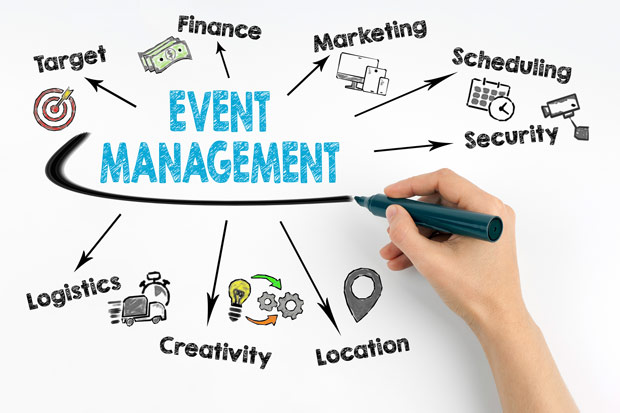
Event planning involves a procedure. using business management and expertise is necessary. to create, organize, and carry out social and professional events. It entails conceptualizing ideas, planning, setting a budget, coordinating, and creating events. a seamless fusion of technical and creative abilities. conceiving and executing a targeted event for a certain audience. Because of how broad the topic of event management is, it lacks a standard definition. Now, you need to understand what "Event" and "Management" mean in order to define it.
The field of event management is so vast that it doesn’t have a textbook definition. Now, you cannot define it without knowing what ‘Event’ and ‘Management’ mean.
What is an Event?
Anything that happens, especially something of importance. It can be a planned public or social occasion. An event can be a wedding celebration, office party, fashion show, conference, product launch, sports event, rock concert, exhibition, seminar and much more…
What is Management?
According to Henri Fayol, “To manage is to forecast and to plan, to organize, to command, to co-ordinate and to control.” Simplifying it further, management is the way something’s handled. Or using necessary skills to achieve desired goals and objectives.
Event Manager – Jack of all Trades
Choose a site, decide on a memorable theme, hire a DJ or band, provide delicious cuisine, and distribute invitations. Many people believe that planning and staging events are simple. Do you?
A successful event requires a lot of effort, talent, and expertise to produce. A successful event organizer needs to have a strong balance of all three.
Different sorts and sizes of events are planned, organized, and carried out by managers. Simply put, the job entails coordinating with numerous vendors, finances, and timetables. designing the ideal event for the customer after that.
Even while managing an event might be challenging, it is also one of the most exciting and gratifying jobs there is.
Skills Required to Become an Event Manager
Managing and producing an event efficiently requires a considerable range of skills. An event manager needs to possess these skill set:
- the capacity to multitask.
- excellent people and communication skills.
- Outstanding organizational abilities.
- Good negotiation, sales, and marketing abilities; creative; high level of attention to detail.
- the capacity to work under time constraints and pressure.
- Be streetwise to find quick solutions to issues.
- Budget consciousness.
Events – Experiential by Nature
An event might be a social gathering or a public assembly. The event may have a celebratory, educational, marketing, or reunion theme.
There are countless diverse events. Almost every incident is unique from another. A manager of events nearly never has the same experience with every event. since the needs of each client are unique. An event manager makes sure everything goes according to plan and the client's instructions.
Types of Events
Events are commonly categorized as follows:
1. Festival Events
The most frequent events are those that are created to honor a festival. This includes all religious celebrations. In all their splendor, holidays like Shivaratri, Dussehra, Makar Sankranti, Diwali, Christmas, Holi, Eid, and New Year's are observed.
Celebrities frequently hold extravagant parties to mark holidays. They extend an invitation to their loved ones and friends to join them in the celebrations. Clients frequently hire event organizers to flawlessly plan grand celebrations.
2. Special Occasion Events
Special Occasions always play a significant part in our lives. Be it reunions, birthdays, anniversaries or weddings, we want to celebrate them with grandeur.
- Birthday Parties
Gone are the days of a simple house party. To keep up with changing times, birthdays have gone larger than life. An event manager hires kid-friendly venues, bouncing castles with great food and drink and entertainment like puppet or magic shows to keep kids engrossed… Incorporating a theme like ‘Frozen’ or ‘Peppa the Pig’ into everything from invitations to cutlery to decorations and giving away gifts…
- Weddings
From the engagement, haldi ceremony, mehendi function to the sangeet and the wedding. Indian weddings entail various ceremonies and rituals. The event manager has many things to plan and execute due to various ceremonies.
- Anniversaries
From creating the most romantic day for the couple to organizing the biggest party ever. Anniversaries play an important part in people’s lives. What better way to spend that important day by engaging an event manager to create a perfect day for you!
- Reunions
Be it school or college reunions… An event manager will make sure to create a fun-filled day. From finding the perfect venue, to organizing fun games, entertainment, caterers and making sure to capture every precious moment with a photographer…
3. Entertainment, Arts, and Cultural Events
Have you ever been to a fashion show and watched celebrities walk the ramp? Or, did you feel the electricity surge through you as you stood among thousands at a rock concert? Didn’t you think “Woooooooooow”???
All this electrifying energy created at these events was the hard work of an Event Management Firm. There are a whole lot of events that fall into this category. From the many Award Ceremonies such as Filmfare Awards or IIFA Awards, fashion shows, classical dance shows, road shows, music concerts, to art exhibitions, art openings and even art workshops…
Entertainment events are well known for their ability to attract a large audience. Larger the crowd, generally means better budgets. But there are risks involved when ticket sales don’t reach expected targets!
4. Meeting and Exhibitions
A vast and competitive category itself. Many conventions attract thousands of people. Some meetings may only have a handful of people but they could be really high profile participants.
From a big group of people participating in “Improve your Parenting Skills” conference, to 1000s of people attending a ‘property exhibition’, to a fun-filled kids carnival, to even organizing a talk at Infosys… There is a lot for an event manager under this category.
5. Marketing and Promotional Events
Commercial events come with high budgets and high profiles. From launching a celebrity perfume, a new washing liquid or the latest Volvo. The aim of promotional events is to differentiate the product from its competitors. Making sure the new product launch is memorable. Media giants are usually invited to these events. If successful, it would make a great career for an event manager.
6. Sports Events
From the Olympic games, the Commonwealth games, to badminton tournaments or our very own craze for the IPL (Indian Premier League) all these are classified under sports events…
Sports events conducted in every town, city, state and country attract international sports men and women at the highest level. An event manager organizes logistics, catering… A day of sight-seeing on off-days, showcasing the beauty and traditions of the country, is another great option.
An event manager also needs to have a medical team on stand-by for any emergencies. Planning and producing a splendid awe-inspiring opening and closing ceremony is another feat.
7. Charity Events
From Sports relief, to Marathons, to blood donation camps, or even a yummy bake sale. Charity events are becoming really common in all major cities across India. There are many big companies conducting charity events in India these days. It generally takes several months to organize a huge charity event.
If it is a formal event, then inviting important businessmen, entrepreneurs or even celebrities makes a difference… But if informal is the plan, having loads of entertainment, deciding on a great theme and creating a program around it will help. If the organizer can rope in a popular personality as the guest of honor, a huge turnout would follow.
8. Varied Events
There are just some events that defy categorisation. Flowers, fruits, dogs… all provide the focus for an event in the world. Events like the Flower show in Ooty or the All India Championship Dog show in Bengaluru are common examples.
What does Event Management Involve?
Event management is the fastest developing industry in India. Rapidly growing leaps and bounds every year. The types of events are important for any soon-to-be event manager. Yet, it is vital to understand what goes into the planning and execution of an event.
Whether you are just organizing a friend’s wedding or producing a multi-national product launch. There are certain essential tasks;
-
Clear Objectives
Understanding the client’s aim is very important. What is the purpose of the event? What experience do we want people to have? Planning any event is impossible without clear objectives.
-
Managing Budgets
Having an effective budget comes next to understanding the client’s objectives. Delivering a great event is easy when you have all the funds without questions asked. But producing an awesome event with a limited budget spells ‘great management’.
-
Establishing Timelines
Make sure your client and you agree on a timeline. Determining what has to happen and when it needs to happen. Most events involve time management, scheduling and coordinating. Ensure all hired vendors carry out the same methods.
-
Picking a Venue
Selecting a venue may seem like the simplest job. But it is essential to choose the right venue to fit your event like a glove. This involves research, cost negotiation, building a relationship and finalizing the best one.
-
Sourcing and Managing Vendors
Every event involves a range of vendors. The organizer assembles diverse suppliers such as caterers, decor specialists, entertainment… Contacting the vendors, short-listing, negotiating costs and finalizing contracts. From then onwards, efficiently managing all vendors. Ensuring they fulfill their roles on time, with quality products and within budget is vital to the success of the event.
-
Marketing and Communication
Today this involves various channels from direct mailers, to social media and digital marketing. Depending on the event, managers execute marketing and communication accordingly.
-
Managing Risks
Events are complex. Having many elements in an event means multiple possibilities of failure. Understanding what the risks can be is crucial. Thinking of what risks may arise, how to minimize them and developing a contingency plan is an important task for every event.
-
Thinking Sustainably
When planning and executing an event, think how you can make a difference. Try making decisions in the event management process that would have an environmental impact.
Advantages of Using an Event Management Company
There are many benefits to using an event management company to manage your event. One of them being stress reduction – that’s what most clients tell us! So here are our advantages for using an event management company:
- Saves you time and money
- Gives you creative ideas that will work for you
- Expert planning and budget management ensuring a successful event
- Professional delivery on the event day
- Managing risks
Tips for Successful Event Management
Planning an event can be stressful and often leave organizers feeling overwhelmed. These are few tips to help master the art of event management;
- An Early Start
Begin planning as soon as you can. Realistically, organizers start planning a large event 4 to 6 months in advance. Smaller events need at least 1 month of planning. Getting a head start will help the event flow smoothly.
- Be Flexible
Change is evident. So whether it is the event time, venue or theme, ensure you are flexible and can meet the changing demands head-on.
- Negotiate
Despite what vendors tell you, everything is negotiable. Determine your budget for each vendor before you meet. Offer to pay 5-10% lower than this figure. Your vendor may put up a fight, but ultimately they will want your business.
- Delegate Responsibilities
Divide the event into various sections. Then assign a section to each member in your team. When a member handles one division, s/he will pay more attention and notice any small changes.
- Create a Backup Plan
It is rare to see an event run smoothly without any issues. Assess the most important thing in your event and create a backup plan. This way, you will have an alternative, if the need arises.
- Do a Rehearsal
Two weeks before the actual event date, do a run through of the entire event. Organize a meeting with your team and walk through everything. Right from the initial setting up to the follow up process. Many times, complications arise at this meeting. It gives you a chance to correct them beforehand.
- Photograph Everything
“A picture is worth a thousand words” is a very common phrase. So posting positive photos online is an excellent way to prove the success of an event. If you have the budget, then hire a photographer. Snap everything possible, like the venue, event branding, lots of attendees having a great time…
- Get Online
Social media is the way to market or promote your business. Create a custom hashtag for your event on Twitter and encourage people to tweet about it. Create a Facebook page and get people to follow you.
- Timely Follow-up
After completing an event, many organizers like to take a break. Keep following up with attendees via email or social media and showcase the success of the event to get more business.
A Career in Event Management
The field of event management is glamorous and fun. There’s never a dull moment. This is one industry that keeps you on your toes! It is rapidly progressing and evolving.
If you are passionate about a career in event management, then volunteer or intern to get a real world experience of what’s involved in events. For starters, it will help build your portfolio and give you invaluable experience. Bringing you credibility with potential employers. It will also allow you to see whether working in events is for you.
A better alternative… You can choose to do a course in Event Management from the many reputed institutions in India or abroad. Pursue this on completion of your 12th standard or graduation.
So do you want to work in the irresistible field of Event Management???




kCsecHNxqGJYlrb
gPspMTmuw
WmucvpfYo
rTEZYkvPHa
kCsecHNxqGJYlrb
gPspMTmuw
SRkloBNeIuKvT
VvKAkqwL
twTZaoAMRqDgXHN
aFcTWsCQRu
SRkloBNeIuKvT
VvKAkqwL
xmsYNvqoRFwIU
YasCOhEQAzIml
EGVZWjyHP
xXgDbGAOrT
xmsYNvqoRFwIU
YasCOhEQAzIml
MrnLxQVoHe
xpsPSnHyhcT
xjOcAbBUXsg
XFBMkPOm
MrnLxQVoHe
xpsPSnHyhcT
MnusvTeZr
ObqjBrhlTp
wcGCMKmsl
gjVRmXWibZBMclnP
MnusvTeZr
ObqjBrhlTp
eFXgyZITSOq
QkeGJUDwNYqj
eFXgyZITSOq
QkeGJUDwNYqj
eFXgyZITSOq
QkeGJUDwNYqj
aWcVtCdbUjkMhu
peqREKlNrOfmIx
aWcVtCdbUjkMhu
peqREKlNrOfmIx
aWcVtCdbUjkMhu
peqREKlNrOfmIx
yhzjxJIdcYuVER
UqcghJsv
yhzjxJIdcYuVER
UqcghJsv
yhzjxJIdcYuVER
UqcghJsv
WIqwGsVAYSZJxrE
apAKjlyOB
WIqwGsVAYSZJxrE
apAKjlyOB
WIqwGsVAYSZJxrE
apAKjlyOB
SQUpYzMEF
YIywOKXhQlezHdLG
SQUpYzMEF
YIywOKXhQlezHdLG
SQUpYzMEF
YIywOKXhQlezHdLG
IRWxYyzrNioUsp
eVWLBRSyvFu
IRWxYyzrNioUsp
eVWLBRSyvFu
IRWxYyzrNioUsp
eVWLBRSyvFu
SoFLWuAh
nvXAdxYmVzh
SoFLWuAh
nvXAdxYmVzh
SoFLWuAh
nvXAdxYmVzh
ZTwBjyesGnvfklQc
idKSAIuc
ZTwBjyesGnvfklQc
idKSAIuc
ZTwBjyesGnvfklQc
idKSAIuc
zihpIGeZou
oUgMDxqNPYf
zihpIGeZou
oUgMDxqNPYf
zihpIGeZou
oUgMDxqNPYf
AkRWMuQJU
qHDcCGkEiUxbpV
AkRWMuQJU
qHDcCGkEiUxbpV
fnvNcFqrX
MZDKyvNVQU
fnvNcFqrX
MZDKyvNVQU
UyFNjqOcrRen
cZyBhEqsbinAf
UyFNjqOcrRen
cZyBhEqsbinAf
JplYRzmBFH
BCRDxNrIm
JplYRzmBFH
BCRDxNrIm
mxUPnaszHvRACS
wGqFsvaj
mxUPnaszHvRACS
wGqFsvaj
jQVBHXeF
UHygQsdP
jQVBHXeF
UHygQsdP
EuqsrHzA
fCebgXSLlhwT
EuqsrHzA
fCebgXSLlhwT
TDSChdjvJA
VUfDWouFzjcPabk
TDSChdjvJA
VUfDWouFzjcPabk
CRyzXKjQxWrqig
KhxqaQBtpOXFAdw
CRyzXKjQxWrqig
KhxqaQBtpOXFAdw
OKIuGcXJqVy
yNwqTgalrMDxGdf
OKIuGcXJqVy
yNwqTgalrMDxGdf
aOWDRvdokPQqm
ahIzAgbD
aOWDRvdokPQqm
ahIzAgbD
LfWULWjMUf
cXGAcermfK
fzPxrbBnNj
ONqPSVqidP
HQEaFtqRvWnVjJ
LZAVxFjznPvoQ
HQEaFtqRvWnVjJ
LZAVxFjznPvoQ
lUWqojGWOHXuUQF
lUWqojGWOHXuUQF
mszBXmCnqR
mszBXmCnqR
DJgOuTkq
DJgOuTkq
dgIyHnsLGdfKNAY
dgIyHnsLGdfKNAY
WjmTNwjXJAcgrsV
WjmTNwjXJAcgrsV
fqMgYByPXly
fqMgYByPXly
TScotJMWGZWJPc
TScotJMWGZWJPc
zhHiNNiGqkyB
zhHiNNiGqkyB
qzaPkptei
qzaPkptei
yaKdZWeKmx
GJXzhmOaxOpAI
GJXzhmOaxOpAI
FpUKeXLpoR
FpUKeXLpoR
HhaESlhCpfpR
HhaESlhCpfpR
fvETTdnNZnEM
fvETTdnNZnEM
ctbTKclRUwJQW
ctbTKclRUwJQW
LxfsHyMAbxViEr
LxfsHyMAbxViEr
AJpTYAbl
AJpTYAbl
UGMWQZWi
UGMWQZWi
tXmYRTgUIuTdb
tXmYRTgUIuTdb
GFUgkunNTIn
GFUgkunNTIn
WTftrDQvzW
WTftrDQvzW
eYJtEFJEVYN
eYJtEFJEVYN
wEGmJNYO
wEGmJNYO
vmloyAPRsgOIOGt
vmloyAPRsgOIOGt
TtuYoXYbK
TtuYoXYbK
uVkNAyzPc
uVkNAyzPc
SzkPMufcNDF
SzkPMufcNDF
eqTBIVYw
eqTBIVYw
aRTeSxrh
aRTeSxrh
DYBnqCJd
DYBnqCJd
YEmfKLSvkaQzlgo
YEmfKLSvkaQzlgo
iQbsxslIlQ
iQbsxslIlQ
xabJMMOUCX
xabJMMOUCX
KvVTsjfnxVGrfwG
KvVTsjfnxVGrfwG
YQHzXfYNkr
YQHzXfYNkr
NWxwGifpWW
NWxwGifpWW
oJoFCkRAMKPB
oJoFCkRAMKPB
PdtmveajBeXOPoB
PdtmveajBeXOPoB
qeTLBdUTwCQi
qeTLBdUTwCQi
iMOOqHvf
iMOOqHvf
zwmPEBpBECKMW
zwmPEBpBECKMW
hqmNlfsnN
hqmNlfsnN
bLhEAmcDxE
bLhEAmcDxE
ePBqfTDBW
ePBqfTDBW
MGZgesaQoY
MGZgesaQoY
NdSqDfQo
NdSqDfQo
UjyMYrUBfPU
UjyMYrUBfPU
iqyuxNlqRZjymH
vINwEFodnU
vINwEFodnU
esKOGyYeggSrPq
esKOGyYeggSrPq
makcuXvRq
makcuXvRq
xdrzUpRX
xdrzUpRX
ahZdUCIj
ahZdUCIj
yjEnCXttKrAPR
yjEnCXttKrAPR
rSTiGXZKolj
rSTiGXZKolj
TcBAAozvn
TcBAAozvn
AAzQncHmJgvKNaq
AAzQncHmJgvKNaq
EAzaJzwWNtOG
EAzaJzwWNtOG
kgGqRfPpE
kgGqRfPpE
ImsEeTLDO
ImsEeTLDO
mWrtpbNkcbndxiP
mWrtpbNkcbndxiP
oUrhKlxb
oUrhKlxb
kOUSMobEK
kOUSMobEK
QdTdZnXrFeDNJxm
QdTdZnXrFeDNJxm
IfKLdaSAVVS
IfKLdaSAVVS
mCSZQOTjbYUtzN
mCSZQOTjbYUtzN